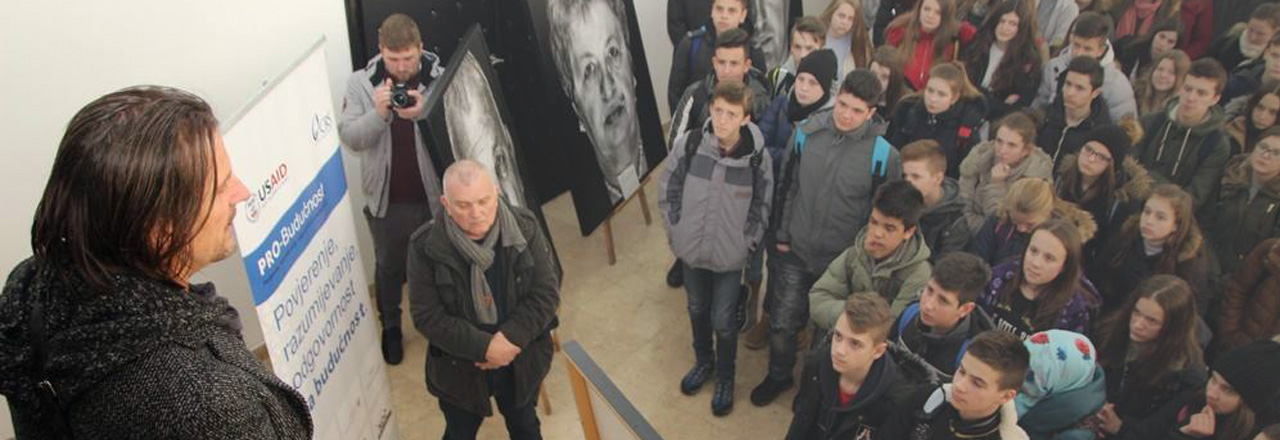

Peace Building Project for the Future of Bosnia and Herzegovina
Janko Samouković, Amir Omerspahić and Stanislav Krezić – a Serb, a Bosniak and a Croat. During the war in Bosnia and Herzegovina (BiH) from 1992 to 1995, all three were imprisoned in the camps of the opposing sides, where they witnessed and endured great suffering. Today, they advocate for peace, reconciliation and understanding by telling their stories.
"I don't want to hate,“ Janko said. “For my own sake, for the sake of my peace, because I believe that hatred doesn't allow us to be happy."
Amir wants to make sure what happened to him never happens to anyone else.
"Young people should not judge people based on their faith or ethnicity, but on whether they are good or bad“ Amir said. “I'm telling this because I don't want anyone to experience war anymore, because war brings evil, suffering, and lifelong consequences," explains Amir Omerspahić, another ex-prisoner of war.
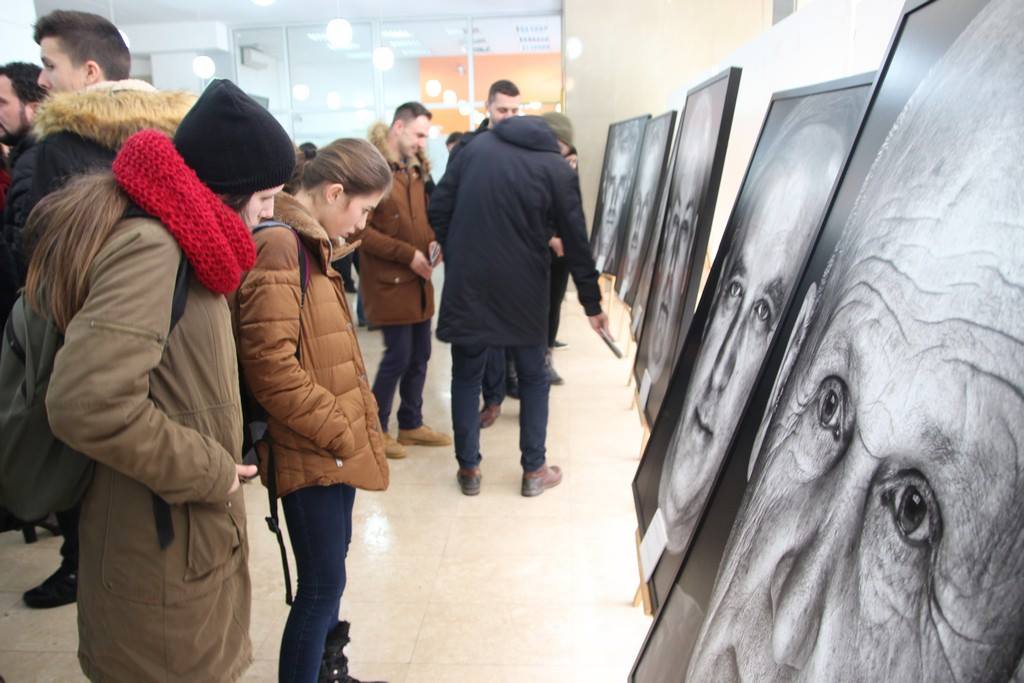
Young people at the exhibition of portraits of war camp prisoners “PERSONAL”, which is accompanied with public speaking event. Photo courtesy of CRS partner.
"It all depends on us on how persistent we are in healing our wounds,“ Stanislav said. „I believe what is currently being done should have been done a long time ago—the wounds would be less painful or completely gone by now. Let us extend a hand of peace."
Whether their audiences are high school students at a youth camp, ordinary citizens, or high-ranking politicians in parliament, one thing is always the same: their testimonies leave a strong impression on people.
Janko, Amir and Stanislav are not alone in their pursuit of peace and understanding. Many other veterans, former prisoners, and victims of war have joined them in this mission. They have taken on the roles of public speakers, activists, and heroes of peace, sharing their experiences to warn about the evil that war brings and reminding people that without justice, reconciliation, and forgiveness, building a healthy society is impossible.
So far, they have shared their stories with over 6,000 people at more than 100 public speaking events organized by Catholic Relief Services (CRS) as part of the PRO-Future project.
Together for the Future
Collaborating with numerous individuals and organizations, citizens, and stakeholders from the political, academic, and public spheres, CRS implements a comprehensive and diverse set of activities to support the building of long-term and sustainable peace in Bosnia and Herzegovina through the PRO-Future project.
As the acronym of its title in Bosnian suggests (PRO-Budućnost: Povjerenje, Razumijevanje, Odgovornost za Budućnost), PRO-Future is focused on trust, understanding, and responsibility for the future.
This project, funded by USAID, has been implemented by CRS for ten years, in partnership with Caritas BiH, Institute for Youth Development KULT, Forum of Tuzla Citizens, Helsinki Citizens’ Assembly Banja Luka, Interreligious Council of BiH, Mozaik Foundation, and others.
During the 1992–1995 war, 100,000 people were killed in Bosnia and Herzegovina, and two million—half of the country's population—were displaced. Nearly three decades after the war, political disputes and ethnic tensions continue to plague the country, hindering its progress towards achieving lasting reconciliation and building a functional society based on the rule of law and respect for human rights. In such an atmosphere, more and more young people are leaving Bosnia and Herzegovina for security, a better life, and a more promising future.
The widespread war crimes and crimes against humanity, ethnic cleansing, mass rapes, concentration camps, and torture that took place during the conflict left people with deep scars and severe trauma and eroded their trust among communities.
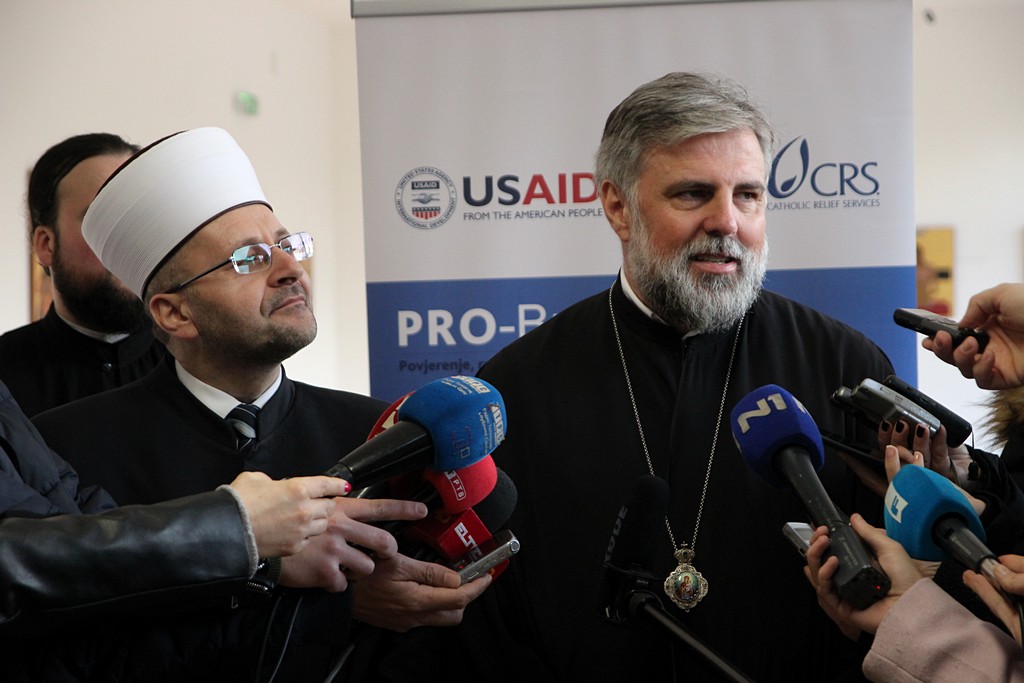
Religious officials talk to the media to promote the Platform for Peace of the PRO-Future project. Photo by CRS staff.
Working for a decade with citizens and key figures in politics, public institutions, media, and education, PRO-Future focuses on advocating for political accountability, dealing with the past, and promoting reconciliation, understanding, and inclusion.
The project directly involved more than 110,000 citizens – victims of war, women, religious and political leaders, youth, activists, NGOs, key local actors, and others.
Today, PRO-Future operates in more than 75 municipalities and cities in both entities of Bosnia and Herzegovina and has partners at all levels of government, in media, the academic community, and organizations dedicated to peacebuilding and fostering trust among citizens of all ethnic and religious groups.
Platform for Peace
In addition to on-the-ground project activities aimed at raising awareness among the general public, to achieve the goals of PRO-Future it is essential to have an institutional commitment from all levels of government to work towards promoting peace, reconciliation, understanding, and achieving a shared vision for the future.
With this intent, CRS started an initiative and developed the Platform for Peace in collaboration with the State Ministry of Human Rights and Refugees, who has a role to monitor its implementation. This declaration encapsulates the need for reconciliation in the country and provides a vision of what a reconciled BiH could look like.
The Platform for Peace sends a message of support for peacebuilding and defines concrete activities through which political parties and their leaders, cultural and educational institutions, religious communities, media, and others can instigate positive changes in society and bridge the divides. The Platform serves as a framework that encompasses and permeates all other project activities.
The signatories commit to providing direct support to individuals and organizations implementing peace projects aimed at building a solid foundation for stable peace in the country.
Platform for Peace has been accepted and adopted by numerous governmental bodies at all levels, including the Council of Ministers, both houses of the State Parliament, cantonal and city assemblies, more than 70 mayors, as well as numerous political parties, representatives of religious communities, war victim associations, and media.
Comprehensive Set of Activities
Based on the principles and ideas outlined in the Platform for Peace, CRS carries out a broad spectrum of activities.
Particular emphasis is placed on working with youth as the carriers of building a better society of tomorrow. Young people, who were not born during the war, are still often exposed to hate speech and divisive rhetoric through media, online platforms, and even educational institutions and curricula.
Young people are involved in the project through youth camps, living libraries, support for cultural and sports events, mental health care, music, film, art, and other activities that strengthen dialogue. The project has supported numerous cultural and sports events by collaborating with artists, athletes, and other public figures.
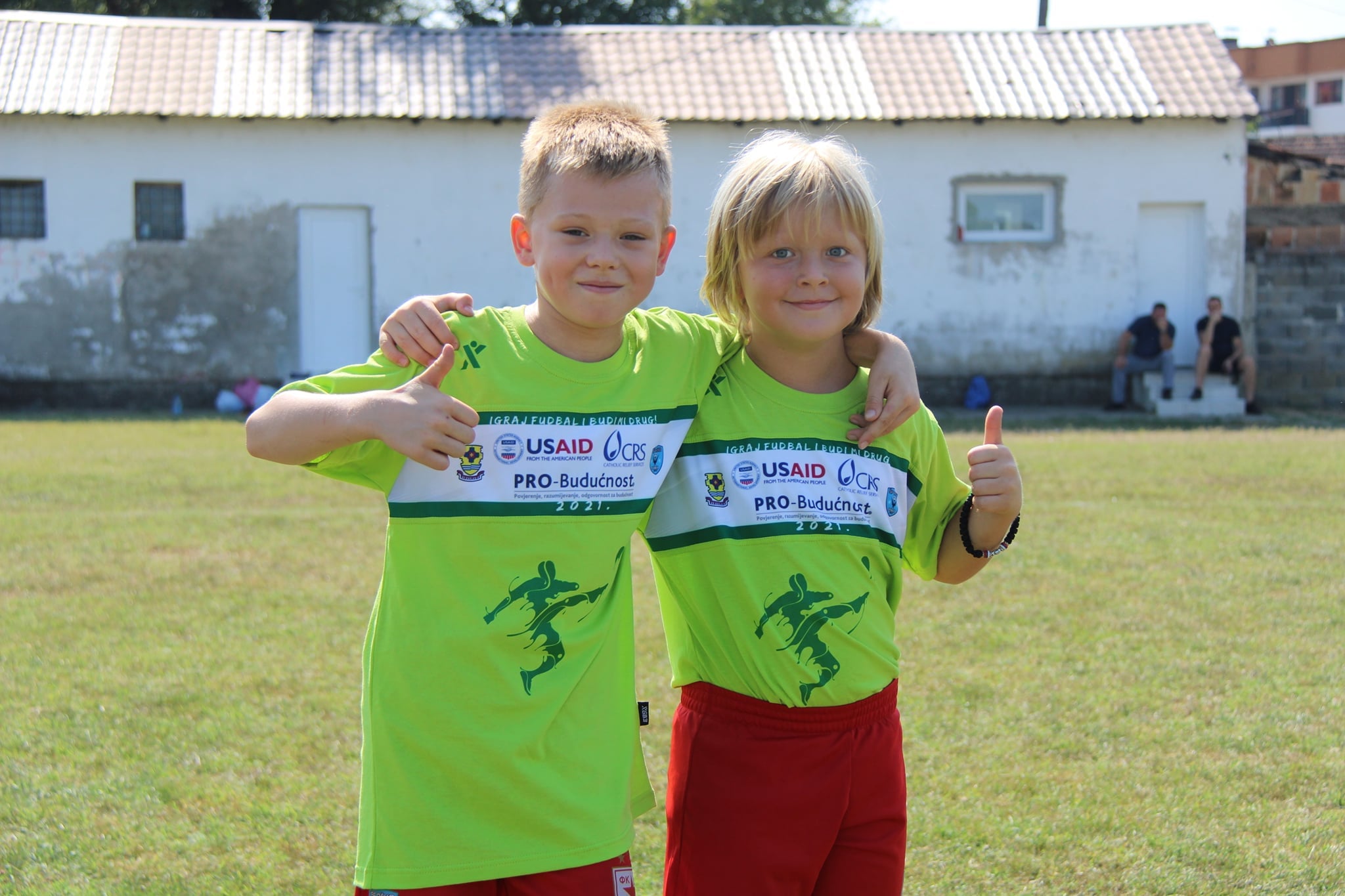
Peacebuilding through sport - dozens of children from different nationalities spent time playing and learning with the aim of promoting a healthy lifestyle and friendship. Photo courtesy of CRS partner.
Hundreds of activities that connect communities and people have been supported through small grants to strengthen the social cohesion, at the same time providing chances for growing the capacity of youth and other civil society organizations and individuals.
Peacebuilding topics are introduced into the education system. PRO-Future collaborates with public universities in Bosnia and Herzegovina to connect across entity line, and Peace Education, supported by key education stakeholders, is implemented in more than 60 secondary schools.
Three generations of young politicians —future leaders—have attended the Peace Political Academy, learning about responsible approaches to politics, peace activism through politics, and the importance of consensus.
Victims from all three ethnic groups are encouraged to speak publicly about their experiences, and key stakeholders are involved to support the visits to places of suffering, opening up the opportunity for people to develop empathy towards all victims and overcome stereotypes and prejudices they may have towards others.
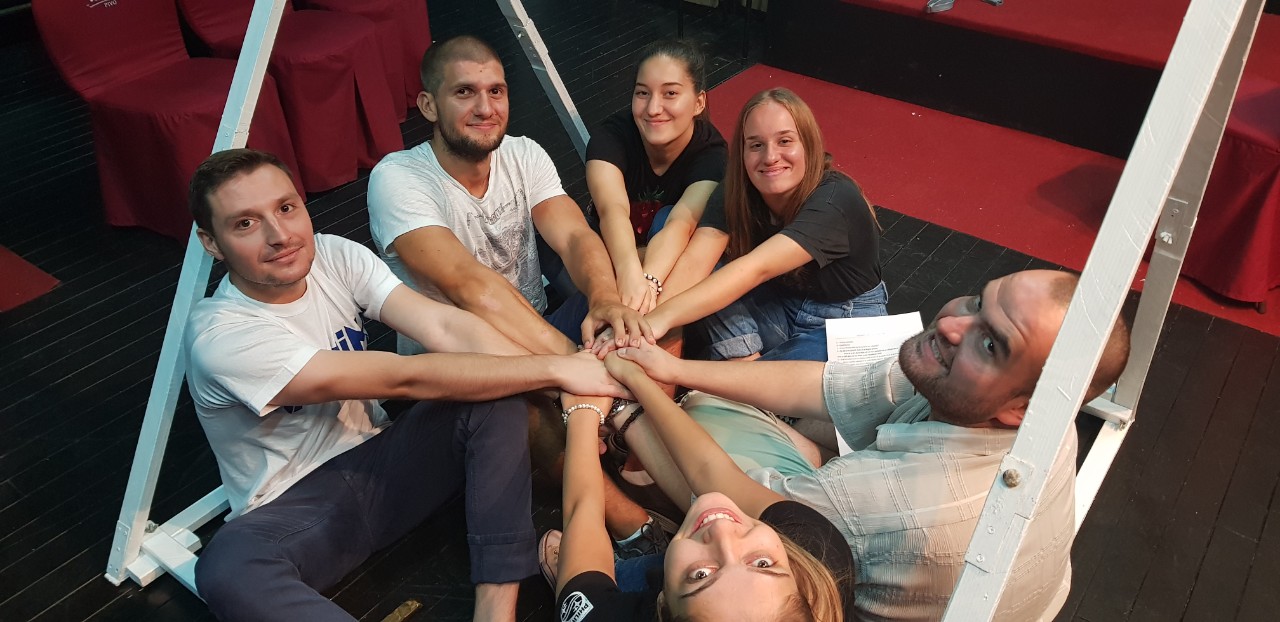
A group of young people pose for a photo during the rehearsal of the play “Dayton,” which was created with support from PRO-Future small grants. Photo courtesy of CRS partner.
In partnership with local authorities, the significant funds and efforts have been invested in renovating sports fields, town squares, parks, playgrounds, cultural centers, and similar facilities in more than 25 participating cities. These improvements enhance the quality of social life in local communities and provide opportunities for people from different communities to meet and connect through shared activities – dozens of which has already happened.
By connecting private, public, and civil sectors, PRO-Future contributes to promoting socially responsible business and strengthening social cohesion, because a peaceful and stable society is a prerequisite for economic development – and vice versa.
The project has expanded its activities to the region, primarily through youth camps. Regional cooperation is of crucial importance for the future, especially for the new generations, who are still burdened by the past.
Many mayors of local communities have embraced the project's messages, as demonstrated by actions of solidarity in times when different communities needed help, such as during the 2014 floods, the migrant crisis, the earthquake of 2020, and throughout the COVID-19 pandemic.
Through initiatives that empower youth, promote understanding, and encourage dialogue, the project supports building of a society based on trust and empathy. By collaborating and addressing the post-war challenges, the wounds of the past can heal, paving the way for a future of lasting peace.

